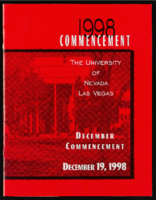Search the Special Collections and Archives Portal
Search Results

Fernando Rocha oral history interview: transcript
Date
Archival Collection
Description
Oral history interview with Fernando Rocha conducted by Nathalie Martinez and Barbara Tabach on November 13, 2019 for the Latinx Voices of Southern Nevada Oral History Project. In this interview, Fernando Rocha recalls growing up in Santa Ana, California and in Sunrise Manor in Las Vegas, Nevada. Fernando Rocha is a Mexican professional who is committed to giving back to the Latinx youth of Las Vegas. He talks about his responsibility as a translator in his family with his siblings. He credits his academic and professional success to the Clark County School District and programs such as GEAR UP and Upward Bound. After studying at Hofstra University, he came back to Las Vegas to work with Wells Fargo and is an active community member as co-founder of the Nevada Youth Coalition and work through the Association of Latino Professionals for America (ALPFA) and Nevada Promise Mentor at the College of Southern Nevada (CSN).
Text

Alan Stock oral history interview: transcript
Date
Archival Collection
Description
Oral history interview with Alan Stock conducted by Barbara Tabach on December 27, 2017 for the Remembering 1 October Oral History Project. In this interview, Alan Stock discusses moving to Las Vegas, Nevada in 1999 for his job as a radio talk show host for KXNT. Stock describes the broadcast that covered the October 1, 2017 Las Vegas mass shooting from 11 PM on that night until 9 AM the next morning. He talks about some of the calls the station received from various members of the community, including survivors of the shooting, families of those at the event, people on lockdown in the nearby hotels, doctors, and general listeners. Stock describes some of the topics discussed on the broadcast, such as what was currently happening on the Las Vegas Strip, stories of the aftermath, and the support needed from the general public. Other topics include gun control and conspiracy theories. He discusses the impact this and other shootings would have on public affairs, including tighter security in daily living and public gatherings. He compares security in the United States to security in Israel and other countries, focusing on the idea of unconcealed guns worn in public. Throughout this interview, Alan Stock explains that the radio station's goal was to provide accurate information to the public during the aftermath of the October 1, 2017 mass shooting.
Text

Astrid Silva oral history interview: transcript
Date
Archival Collection
Description
Oral history interview with Astrid Silva conducted by Monserrath Hernández and Barbara Tabach on April 22, 2019 for the Latinx Voices of Southern Nevada Oral History Project. Astrid Silva was born in Gomez Palacio, Durango in 1988. She immigrated with her mother to the United States in 1992, where they were met by her father before flying to Los Angeles. She recounts her first impression of the United States and her families eventual move to Las Vegas, where she describes her time living in Las Vegas' west side and struggles she faced being an undocumented student living in Las Vegas. She describes her first meeting with Senator Harry Reid and the friendship that developed afterwards. She has spoken at the Democratic National Convention and has been vocal about her status as a Dreamer. She is currently the Executive Director for DREAM Big Nevada which was established in 2017 in order to provide aid to Nevada's immigrant families. She writes about her hopes for Dreamers and her continued work in expanding the ways that immigrant families can be helped in an always changing political climate. Subjects discussed include: DACA, Dreamers, Immigrant Rights, and Higher Education.
Text

Elaine Newton oral history interview: transcript
Date
Archival Collection
Description
Oral history interview with Elaine Newton conducted by Cecilia Winchell, Kristel Peralta, and Vanessa Concepcion on May 19, 2021 for Reflections: The Las Vegas Asian American and Pacific Islander Oral History Project. Elaine Newton shares her family's history living in Hawaii and Japan, and memories from her childhood growing up with her six siblings in Honolulu. She talks about becoming a flight attendant for Pan American World Airways and how she met her former husband, Wayne Newton, after a stop in Vietnam. Elaine recalls their courtship and marriage as well as what Las Vegas life, fashion, and entertainment were like during the 1980s. She also speaks about racial discrimination and anti-asian violence in the past and present.
Text

Sandra Gray oral history interview: transcript
Date
Archival Collection
Description
Oral history interview with Sandra Gray conducted by Elsa Lopez and Barbara Tabach on December 13, 2019 for the Latinx Voices of Southern Nevada Oral History Project. In this interview, Dr. Gray discusses her family history, and describes how her parents are immigrants from Durango, Mexico and moved from East Los Angeles, California to East Las Vegas, Nevada in 1991. After getting her bachelor's degree in psychology from the University of Nevada, Las Vegas (UNLV) she started a behavioral health agency that provided rehabilitative mental health services to children primarily in the foster care system. She went on to earn a master's degree in mental health counseling, a master's in psychology, and a doctoral degree in clinical psychology. She is the founder of Empower LV, which strives for equitable access to sports and tutoring. Dr. Sandra Gray is also the owner and operator of Innovation Behavioral Health Solutions, LLC.
Text

Olivia Meneses oral history interview: transcript
Date
Archival Collection
Description
Oral history interview with Olivia Meneses conducted by Elsa Lopez and Barbara Tabach on September 18, 2019 for the Latinx Voices of Southern Nevada Oral History Project. Olivia Meneses describes growing up in Mexico City and attending la Universidad Iberoamericana during the 1968 student movement that culminated in the Tlatelolco massacre. She discusses migrating to the United States in 1983 and moving to Las Vegas in 1985, where she began teaching Spanish to kindergarten students.
Text

Chet Buchanan oral history interview: transcript
Date
Archival Collection
Description
Oral history interview with Chet Buchanan conducted by Barbara Tabach on November 28, 2017 for the Remembering 1 October Oral History Project. Chet Buchanan begins this interview with a discussion of his move to Las Vegas, Nevada in 1999 after he was offered a job as a radio show host for 98.5 KLUC. He talks about the specifics of his job, including his career background as well as the Chet Buchanan Toy Drive. For this interview, he specifically goes into detail on his coverage of the Las Vegas October 2017 mass shooting and discusses being in San Diego, California at the time, yet still striving to reach people through his broadcast with the help of CBS San Diego. Throughout the interview, Buchanan examines his desire to make a difference in the community with his show and his interactions with the public.
Text

José Eliqué oral history interview: transcript
Date
Archival Collection
Description
Oral history interview with José Eliqué conducted by Barbara Tabach on January 17, 2018 for the Remembering 1 October Oral History Project. In this interview, José Eliqué discusses his responsibilities as the Associate Vice President and Chief of Police for the Department of Police Services at the University of Nevada, Las Vegas (UNLV). He talks about the Police Services Department and its mission to maintain a safe environment on campus. Eliqué discusses the night of the October 1, 2017 shooting and the procedures in place that helped the police officers and detectives support the survivors who made their way to the UNLV campus. He also provides details about using the Thomas & Mack Center as a place of refuge for survivors. In addition to his work in Las Vegas, which started when he moved to the city in 2000, Eliqué discusses his service in the US Navy and his career history in New York City and Chicago, Illinois.
Text

University of Nevada, Las Vegas (UNLV) 35th commencement program
Date
Archival Collection
Description
Commencement program from University of Nevada, Las Vegas Commencement Programs and Graduation Lists (UA-00115).
Text

Transcript of interview with George Pollak by Claytee White, May 25, 2010
Date
Archival Collection
Description
George was raised in Mattapan, a suburb of Boston, by his mother and father. George had four siblings and was the second youngest. George shares fond memories of growing up and playing softball and tennis in the neighborhood park with his numerous friends. George could listen to a song on the radio and play it on the piano by ear when he was as young as four years old. George had several jobs to earn money growing up, including working in a record store and as a busboy. Eventually George and his brother joined a trio with Steve Harrington and performed in clubs. In 1958, George joined his brother and Paulette Richards in Las Vegas where they had a contract to play at El Rancho Hotel & Casino where they played until it was destroyed by fire. Following the fire, George and his brother parted ways and each did their own thing. In the 1960s, George began playing with the band at Caesars Palace. George used his background in accounting to do some bookkeeping and payroll for some of the ban
Text
